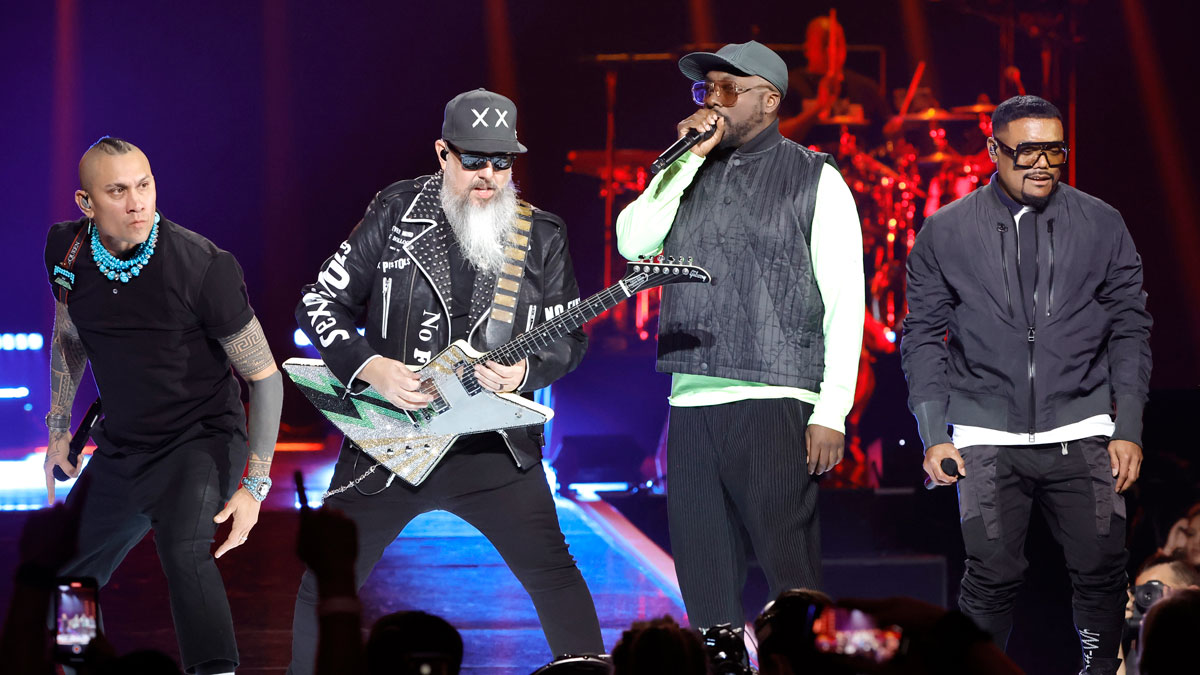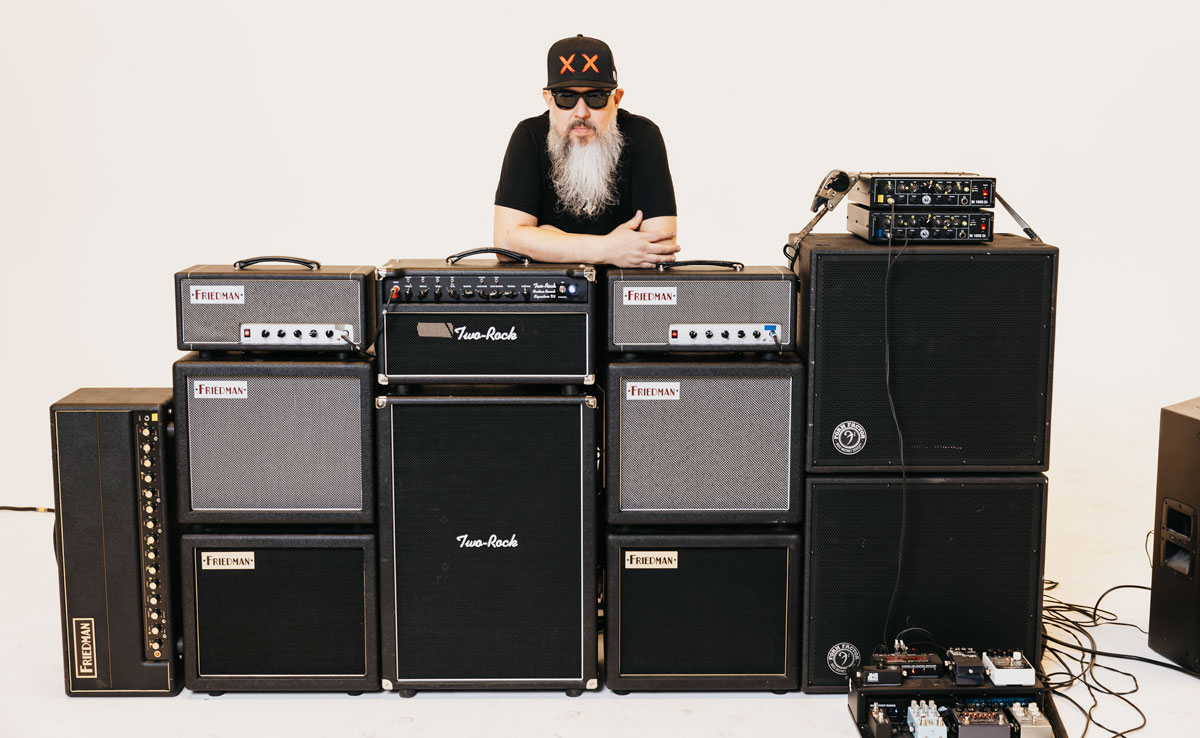“What has kept me in sessions has not been my playing ability, ever. You have to connect with people before you can have a creative flow”: Black Eyed Peas, Sting, Santana – George Pajon Jr. has built an enviable session resume, but it took more than chops
A session guitarist for 30 years – 25 of those with will.i.am. and co – Pajon Jr. is one of the most respected names in the biz. He shares his secrets to success, what prompted him to invent amps that don't exist with Dave Friedman, and how he ended up with a guitar rig so complicated he can't afford to fly with it

George Pajon Jr. loves guitars and owns an impressive collection. But when he and his wife relocated from Los Angeles to Las Vegas, it wasn’t the gear that weighed him down; it was a hefty box stuffed with every issue of Guitar World and other guitar magazines that he began collecting as an adolescent.
Pajon began playing guitar at age nine. “My uncle took out a Candy Apple Red Strat, plugged it into an amp, and blew my mind,” he recalls. “From that moment forward, I was obsessed. I begged my parents for a guitar. They bought me a no-name brand at a swap meet because that’s all they could afford. I never put it down.”
Pajon has been a professional musician for over 30 years, 25 of them as lead guitarist for Black Eyed Peas. It’s a unique pairing in that he brings the instrument into hip-hop while drawing on a range of influences that include classic rock and R&B. He’s also the first to note that his longevity with the band has the opened many doors to his wide-ranging success.
The multi-talented guitarist is also a producer, arranger, session musician, band member, solo artist, television and film composer, and multiple Grammy winner who has shared stage and studio time with Carlos Santana, Ricky Martin, Macy Gray, John Legend, Nas, Sting – the list goes on. His resume is the stuff that cover stories are made of, but he’s not one to chase the spotlight. Pajon plays guitar for one reason: it is his passion.
His skills are in demand because of his talent and work ethic: live up to your commitments, your handshake is your word, always show up on time, never miss a gig or session, take pride in your work. It’s something he learned from his parents and grandparents, who emigrated from Cuba to California with $26 hidden in their pockets and the determination to build new lives and provide for their families.
Pajon’s latest project is new music with Cairo Knife Fight, his duo with drummer/keyboard bassist/vocalist Nick Gaffaney, with whom he partnered in 2015. Earlier this year they released Churn, one of 24 tracks they recorded at Dave Grohl’s Studio 606, and their first since CKF’s 2018 album, Seven. Another album is in the works, with release likely next year.
Your website is a who’s who of live and session gigs. Tell us a bit about working with a diverse range of artists.
Get The Pick Newsletter
All the latest guitar news, interviews, lessons, reviews, deals and more, direct to your inbox!
“Obviously, each one is unique. Black Eyed Peas are my family. I've been with them for 25 years, so a lot of the tools that I've learned – how to write, produce, be a session player – have been honed doing countless songs and records with Will[.i.am.] and the Black Eyed Peas. For each album, we would write at least a couple hundred songs, so that was quite the school to go to. I had my first number one song writing with them, and then I signed a deal to be a writer for EMI. That's when all the other things started coming, some of them with Will. Sting was with Will. Santana was with and without Will.”
What is the key to being a successful session player?
“What has kept me in those sessions and being called back has not been my playing ability, ever. The chops, the playing, the writing – those things get you in the door. What keeps you in the room is your etiquette, your ability to put the person you’re working with at ease and not say or do anything that makes them uncomfortable. That will close the door instantly.
“We’re talking about prolific artists who do this as effortlessly as breathing, so you have to be on that same plane. You learn to recognize and read the room each time. You have to connect with people before you can have any kind of creative flow with them. Once you have that mutual connection, the art flows from that point forward. You build relationships, earn respect, and those things last a lifetime.”
As discussed in your interviews with Pete Thorn and Isaac Kuhlman, your guitar rig has a life of its own. How did it grow to this point?
“That started with Cairo Knife Fight. I wasn’t trying to build a rig. I was trying to complement what the guitar player before me was doing. His basic rig was two stereo amps and a bass rig, and he was dropping his tuning with a [Electro-Harmonix] POG. So I started with those basic things: a Mastermind PBC/10, a couple of Strymon pedals, a looper, and a fuzz pedal that lives in my rig to this day.
“When I did my first couple shows with Cairo, I started to realize deficiencies in how I had designed it. One of my secret weapons is that I've known Dave Friedman for over 40 years. When I have questions, I drive to the shop and say, 'I'm trying to accomplish this. How do I do it?' As the rig started to develop into this crazy monster, Friedman would say, 'That doesn't exist.' My response would be, 'Let's invent it.'
“There's pluses and minuses to that. Big minus: that rig is one of a kind, so I can't fly with it. I can't take the risk because there's no way to find pedals or switching systems that can do what my pedalboard does. As to how it grew to this point, I never get tired of that question because it’s never the same answer. The rig changes daily out of necessity, organically, because I’m constantly programming it with things I hear in my head.”

Do you have a favorite or go-to session guitar?
“Yes. It's a Tele that was built for me by my friend Erik Goehrisch at Lush Guitars. It has no paint on it. I flew an engineer friend of mine out from L.A. to Vegas to fine-tune my amps and mic setup because I was going to record some new parts for the second Cairo single. He looked at that guitar and said, 'This guitar is disgusting. Look at the dirt on this thing.' I said, 'No, that's beauty to me. That's all me. That's not a relic. That's how many years I've been playing it.'
"Erik built this Tele from scratch and it has mojo. It's just a special thing. I can't do a Cairo show or session without it. That's my go-to guitar, period. I use it to dial in all my amps, dial in all my mics in the studio, dial in everything. That's the one.
"I've known Erik as long I've known Dave Friedman. Erik has been the luthier for many famous players, and he’s a legend in L.A. He has done all my setups and all my unique instruments. Fernandes was my first guitar endorsement and Erik was working for them. That's how we met. People asked why I was with Yamaha for so many years. That's an easy question to answer: Erik worked for their custom shop, and all my Yamahas were built by him. I follow him wherever he goes.”
Which guitars do you use onstage with Cairo?
“Two Erik-customized Don Grosh guitars – a Strat-style and a Tele-style. Erik did something on these guitars that shouldn't be working, but it's amazing. My tuning is basically a whole step down from a baritone guitar. The easiest way to accomplish that is to buy a baritone and tune it down, but I don't like the way the neck feels on the baritone. Erik set these up standard scale. They both have those low strings, and Erik customized the guitars so they work in a standard scale. I can't do a Cairo gig without those two guitars.”
And with the Peas?
“With the Peas it's real simple. It's whatever relationship I'm having with endorsers at the time, because they're going to get a lot of airtime and photographs every day, and so you make sure that you bring out guitars that fairly give everyone a piece of the pie.
“Right now, on the Peas Tour, there's eight guitars: two Friedmans, a couple of PRS, a couple Knaggs, and a couple Suhrs. Those are my current existing endorsements.”
How has your background shaped you professionally and personally?
I get to play my instrument, something I would do anyway, as my living. That is not something you take for granted, and that's how I walk into every situation
“Oh, it’s everything! I learned my work ethic and sense of responsibility from my parents and grandparents and that’s what I live by. What they did on both sides of my family – dropping everything, leaving their homes, moving their families to another country – I can’t even fathom. My parents have been married 55 years. That is sacred to me. They continue to inspire me.
“Everything I do, everything I am, comes from my family. I will never forget the pride all my family had in the simplest tasks, because to them it was a blessing. They left Cuba out of necessity, and having these tools to be able to raise their families was a blessing. It was not a given.
“I’ve had that throughout my career. I get to play my instrument, something I would do anyway, as my living. That is not something you take for granted, and that's how I walk into every situation. I'm in the one percentile, probably less than the one percentile, because not many people have been able to accomplish what I've been lucky enough to have, to be put in situations where I can thrive. You have to earn that and you have to thrive in that situation. But it all comes from the pride I have in what I do, and that starts with my family.”
Alison Richter is a seasoned journalist who interviews musicians, producers, engineers, and other industry professionals, and covers mental health issues for GuitarWorld.com. Writing credits include a wide range of publications, including GuitarWorld.com, MusicRadar.com, Bass Player, TNAG Connoisseur, Reverb, Music Industry News, Acoustic, Drummer, Guitar.com, Gearphoria, She Shreds, Guitar Girl, and Collectible Guitar.
“Every tour was the best I could have done. It was only after that I would listen to more Grateful Dead and realize I hadn’t come close”: John Mayer and Bob Weir reflect on 10 years of Dead & Company – and why the Sphere forced them to reassess everything
“Last time we were here, in ’89, we played with Slash on this stage. I don't remember what we did...” Slash makes surprise appearance at former Hanoi Rocks singer Michael Monroe's show at the Whisky a Go Go

![John Mayer and Bob Weir [left] of Dead & Company photographed against a grey background. Mayer wears a blue overshirt and has his signature Silver Sky on his shoulder. Weir wears grey and a bolo tie.](https://cdn.mos.cms.futurecdn.net/C6niSAybzVCHoYcpJ8ZZgE.jpg)

![A black-and-white action shot of Sergeant Thunderhoof perform live: [from left] Mark Sayer, Dan Flitcroft, Jim Camp and Josh Gallop](https://cdn.mos.cms.futurecdn.net/am3UhJbsxAE239XRRZ8zC8.jpg)






